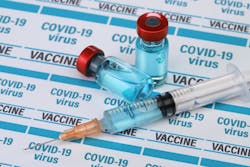Statement on the antigen composition of COVID-19 vaccines
The WHO Technical Advisory Group on COVID-19 Vaccine Composition (TAG-CO-VAC) met on May 11-12, 2023 to review the genetic and antigenic evolution of SARS-CoV-2, the performance of currently approved vaccines against circulating SARS-CoV-2 variants and the implications for COVID-19 vaccine antigen composition.
This statement and the recommendation for change is intended for all vaccine manufacturers and is intended to inform future formulations of COVID-19 vaccines.
Currently approved COVID-19 vaccines should continue to be used in accordance with the current WHO SAGE Roadmap, published in April 2023. Notwithstanding the protection against severe disease, protection against symptomatic disease is limited and less durable. New formulations of COVID-19 vaccines are needed to improve protection against symptomatic disease.
The published and unpublished evidence reviewed by the TAG-CO-VAC included: (1) SARS-CoV-2 evolution, including genetic and antigenic characteristics of earlier and current SARS-CoV-2 variants, including XBB.1 descendent lineages, and its impact on cross-neutralization and cross-protection following vaccination and/or infection; (2) Vaccine effectiveness (VE) of currently approved vaccines during periods of XBB.1 descendant lineage circulation; (3) Antigenic cartography analyzing antigenic relationships of SARS-CoV-2 variants using naïve animal sera and human sera following vaccination and/or infection; (4) Preliminary preclinical data on immune responses in animal models, following infection with XBB.1 descendent lineages; (5) Preliminary preclinical immunogenicity data on the performance of candidate vaccines with updated antigens (data not shown); and (6) B cell memory responses following vaccination and/or infection.
Recommendations for updates to COVID-19 vaccine antigen composition:
There is ongoing and considerable genetic and antigenic evolution of SARS-CoV-2, high seroprevalence and heterogeneous population immunity to SARS-CoV-2. As current WHO SAGE policy specifies, vaccination programs should continue to complete the primary series and booster dose(s) for high priority and medium priority groups. Furthermore, the WHO Global COVID-19 Vaccination Strategy, published in July 2022, also calls for vaccines with improved durability and breadth of protection.
Updates to vaccine antigen composition may enhance vaccine-induced immune responses to circulating SARS-CoV-2 variants, consistent with the previous statement by the TAG-CO-VAC published in June 2022.
As of May 2023, XBB.1 descendent lineages predominate SARS-CoV-2 circulation globally. In order to improve protection, in particular against symptomatic disease, new formulations of COVID-19 vaccines should aim to induce antibody responses that neutralize XBB descendent lineages. One approach recommended by TAG-CO-VAC is the use of a monovalent XBB.1 descendent lineage, such as XBB.1.5 (e.g., hCoV-19/USA/RI-CDC-2-6647173/2022, GenBank: OQ054680.1, GISAID: EPI_ISL_16134259 or WHO Biohub: 2023-WHO-LS-01, GenBank: OQ983940, GISAID EPI_ISL_16760602) as the vaccine antigen. Given the small genetic and antigenic differences from XBB.1.5, XBB.1.16 (e.g., hCoV-19/USA/MI-CDC-LC1038976/2023, GenBank: OQ931660 GISAID: EPI_ISL_17619088) may be an alternative. The spike antigens of both of these lineages are genetically and antigenically very closely related, with only two amino acid differences between XBB.1.5 and XBB.1.16 (E180V and T478R). Other formulations and/or platforms that achieve robust neutralizing antibody responses against XBB descendent lineages can be considered.
While currently approved COVID-19 vaccines, including those based on the index virus, continue to provide protection against severe disease, the TAG-CO-VAC advises moving away from the inclusion of the index virus in future formulations of COVID-19 vaccines. This is based on the following reasons: the index virus and antigenically closely related variants no longer circulate in humans; the index virus antigen elicits undetectable or very low levels of neutralizing antibodies against currently circulating SARS-CoV-2 variants, including XBB descendent lineages; inclusion of the index virus in bi- or multivalent vaccines reduces the concentration of the new target antigen(s) as compared to monovalent vaccines, which may decrease the magnitude of the humoral immune response; and immune imprinting due to repeated exposure to the index virus may reduce immune responses to new target antigen(s).

